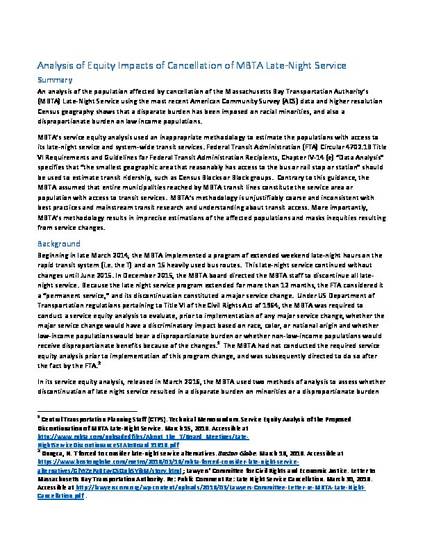
Other
Analysis of Equity Impacts of Cancellation of MBTA Late‐Night Service
(2016)
Abstract
An analysis of the population affected by cancellation of the Massachusetts Bay Transportation Authority's (MBTA) Late‐Night Service using the most recent American Community Survey (ACS) data and higher resolution Census geography shows that a disparate burden has been imposed on racial minorities, and also a disproportionate burden on low income populations. MBTA's service equity analysis used an inappropriate methodology to estimate the populations with access to its late‐night service and system‐wide transit services. Federal Transit Administration (FTA) Circular 4702.1B Title VI Requirements and Guidelines for Federal Transit Administration Recipients, Chapter IV‐14 (e) " Data Analysis " specifies that " the smallest geographic area that reasonably has access to the bus or rail stop or station " should be used to estimate transit ridership, such as Census Blocks or Block groups. Contrary to this guidance, the MBTA assumed that entire municipalities reached by MBTA transit lines constitute the service area or population with access to transit services. MBTA's methodology is unjustifiably coarse and inconsistent with best practices and mainstream transit research and understanding about transit access. More importantly, MBTA's methodology results in imprecise estimations of the affected populations and masks inequities resulting from service changes.
Disciplines
Publication Date
May, 2016
Citation Information
Marcos Luna. "Analysis of Equity Impacts of Cancellation of MBTA Late‐Night Service" (2016) Available at: http://works.bepress.com/marcos-luna/36/
